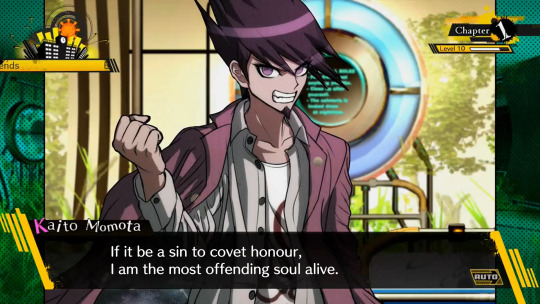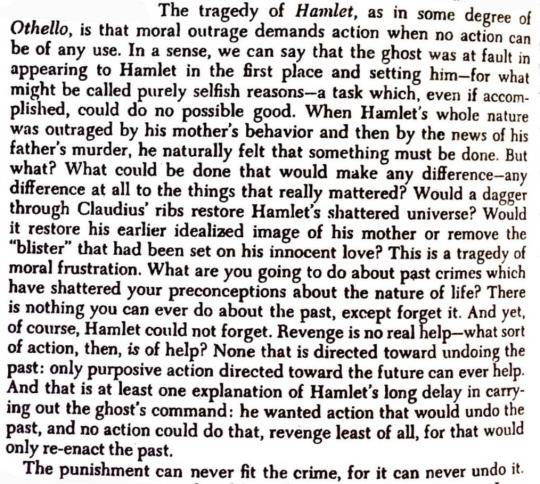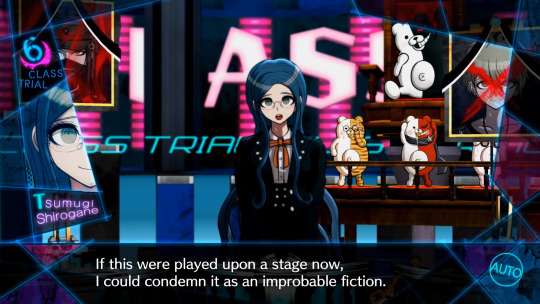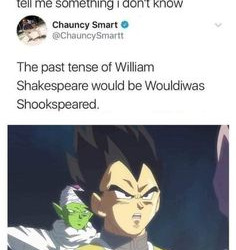#source: william shakespeare
Text

Kaito: If it be a sin to covet honour, I am the most offending soul alive.
Source: William Shakespeare (“Henry V”)
51 notes
·
View notes
Text
Madamoiselle, you bereft me of all words. Only my blood speaks to you een my veins, and zere ees such confusion een my powairs.
Pepe le Pew to Penelope Pussycat
3 notes
·
View notes
Text

How Greif Devours Identity in Hamlet: An Informal Short Essay
Inspired by If We Were Villians, I took it upon myself to freshen up on my Shakespeare. So, last night I finished reading Hamlet for the first time since my freshman year of college! It was a trip to relive all of my old annotations and notes on the play, and to dive back into Shakespeare after such a long time. Thank Folger Shakespeare Library for footnotes!
A few things caught my attention, especially the theme of identity and grief being so intertwined. So let's talk about it for a moment~~
As somone who has experianced a little too much grief in my lifetime, it was cathartic to read Hamlet and appreciate others processing loss. Shakespeare, the master of words and human emotion that he is, has painted the transformative... if not transfiguring... powers of grief on the human mind. This is not exclusive to the character of Hamlet himself, though his madness is the center of the play, but includes all the characters.
Since I have made myself promise this will be a short essay, i'll localize my thoughts on a specific passage:
"Not where he eats, but where he is eaten. A certain convocation of politic worms are e'en at him. Your worm is your only empoeror for diet. We fat all creatures else to fat us, and we fat ourselves for maggots. Your fat king and your lean beggar is but variable service-- two dishes but to one table. That's the end" (Act 4, Scene 3).
So, here's the thing... I took this a little differently than Shakespeare may have intended in this scene. The talk of the "worms" which feast on us when we are dead made me think of The Corpse Bride by Tim Burton.
In Emily's ear is a maggot that acts as her concience. He eats at her mind and replaces her thoughts with his own. I couldn't help but feel that is exactly what grief has done to these characters. Like worms, fattening upon each character, sorrow, revenge, fear, and guilt all crawl into the ears of the court and feast until there is nothing left.
For example, take Hamlet at the end of this play. Hamlet is "not where he eats," which would be an action of taking the King's life and digesting what has happened to his father, but ends "where he is eaten" by the guilt of not being able to override his character and seek revenge on Claudius until the last moment. Try as he might to change the course of fate (hah, get it course lol), the ending remains the same. Which leads to the line "two dishes but to one table."
We see this all throughout the novel as different sets of characters come to the table: Claudius x King Hamlet, Hamlet x Claudius, Hamlet x Mother, Opheilia x Hamlet, Laertes x Hamlet... etc. Even the lesser characters die in pairs like Rosencrantz and Guildenstern. Two lives devoured together at the same table.
I think this is an interesting way of looking at volitile emotions and understanding how people struggle to cope. Grief can eat at you, literally, and it not only leads to a physical deterioration but to a death of self. No matter how clever and careful you are going about it, no matter what reasons you have, acting against one's character will always eat at one's concience. Especially when you look around and see the other people in your life feasting on the same meal at the same table.
So while grief can feel like a worm in our minds, it's also more common among our companions than we see. Too blinded by our own struggles, we let emotions devour our sense of self, and can't see how our behavior reflects and is reflected back to us. We are what we eat, in all senses.
Which is why I think that Hamelt is an exceptional play on how emotions can play (or prey) on us!
Updated edition of the Folger Shakespeare Library edited by Barbara A. Mowat and Paul Werstine used in this essay :)
#literature#dark academia#books & libraries#romantic academia#aesthetic#classic academia#books#words#light academia#book quotes#if we were villains#william shakespeare#hamlet#shakespeare#personal#corpse bride#picture source: pinterest
46 notes
·
View notes
Text
Nick: Don’t try to confuse me with your use of the word “’twas”!
Shakespeare: ‘Twasn’t trying to.
#incorrect quotes#something rotten#nick bottom#william shakespeare#source: brooklyn nine nine#shakespeare that’s not what twas means
24 notes
·
View notes
Text
It’s easy for someone to joke about scars if they’ve never been cut.
- William Shakespeare
Facts
This is an interpretation btw ^
- Embeccy
#foryou#tumblrpost#quotes#source: tumblr#literature#life quotes#william shakespeare#shakespeare#lifelessons#real life#daily life#overthinking#poems and poetry#poetcommunity#poetry#words#wordsofwisdom#wordswordswords#library#writerscommunity#writers on tumblr#wordofthehour
61 notes
·
View notes
Text
To truly understand Hamlet, you have to understand Shakespeare. To understand Shakespeare, you have to know that before he was a writer, he was an actor. You also need to know that he had three children; two girls and one boy. The boy’s name was Hamnet (during Shakespeare’s time, this name was interchangeable with the name Hamlet, like James/Jim or Eliza/Betty). A couple of years before Shakespeare wrote Hamlet, his son died, when he was very young.
Now, there’s plenty of speculation about roles Shakespeare may have played during his time in the king’s men (his troupe) but the ONLY role we can be fairly certain he played is the ghost of Hamlet’s father.
So in all your interpretations and readings of Hamlet, PLEASE bear in mind that Shakespeare named Hamlet, arguably his most beloved character, after his SON, who he had recently lost. A play about love and grief, and Shakespeare dedicated it to his boy.
It’s so easy to forget that Shakespeare was a real person —Hell, I’ve had people tell me to my face that he was never real at all; that Shakespeare is as fictional as his characters (this is stupid, I could make a whole other post about my hatred of the anti-stratfordian position)— but when you read Hamlet with the knowledge that it was an expression of grief, and a way to process the loss of a child, it becomes so, so much deeper. And the playwright comes so clearly into focus.
Hamlet has so many soliloquies, the most famous, of course, being the act III speech in which he contemplates his own death, and voices his fear of what comes next. (To be, or not to be…). This speech has always resonated with me specifically because the thoughts Hamlet expresses are eerily similar to thoughts I had before I ever picked up a work of Shakespeare. And the raw realness of these lines and feelings often makes me think that Shakespeare’s own voice shines through the character of Hamlet much more than it does through any of his other characters, and maybe that’s why Hamlet feels so real. I can see the author so clearly now that I know the context of the play. You can read almost any part of Hamlet that deals with grief & see right through the plot to hear the voice of a man who was grieving his son, and didn’t know what to do.
I fucking love Shakespeare. Idk if you can tell. And I love taking what limited information we have on him and piecing together a picture of a real man, who had the same thoughts, feelings, and experiences as me.
AND I think it’s so fucking beautiful that 400 years later, we still remember Shakespeare, and we still remember his son, and we read his words and see our own grief reflected in them. I think he would be proud.
#I am too tired to cite my sources#I swear I’m a real academic#just trust me#hamlet#Shakespeare#william shakespeare#Shakespeare’s hamlet#hamlet and horatio#hamlet x horatio#Ophelia
32 notes
·
View notes
Text

op turned off rbs but im foaming
source:[ A Critical History of English Literature, Vol. 1, Prof. David Daiches, first published in 1960 ]
#source according to op didnt check up on it idkidc#moral outrage demanding action when no action can be of any use is all that matters#shakespeare#hamlet#william shakespeare#tragedy
11 notes
·
View notes
Text
Shakespeare:”Hob? I’m Morpheus’s ex”
Hob:”Oh,okay” Pulls out a weapon “We can do this but i will bite you”
Shakespeare:”Is that a morning star?”
#the sandman#morpheus#dream of the endless#dream#william shakespeare#hob gadling#morpheus x hob#dream x hob#dreamling#source: unknown
86 notes
·
View notes
Text
A: Why are we typing like William Shakespeare?
B: I believe the word you’re looking for is “writing”.
#incorrect quotes#2 characters#writing#typing#william shakespeare#old fashioned#technology#source: the big fat quiz of the year
2 notes
·
View notes
Text
Will: Women just throw themselves at me.
Portia: Wow! You must be good at dodging.
16 notes
·
View notes
Text
William: Should I spend 83 dollars on a zombie game?
Romeo: Why?
William: Do I want a zombie game?
Romeo: *thinking back to when William wouldn't buy him a chocolate bar* We can't always get what we want...
William: I DO NOT REMEMBER INVITING YOU TO PARTICIPATE IN THIS CONVERSATION!
#& juliet#&j#& juliet musical#william shakespeare#romeo montague#they are father and son#source: me and my dad
3 notes
·
View notes
Text

Tsumugi: If this were played upon a stage now, I could condemn it as an improbable fiction.
Source: William Shakespeare (“Twelfth Night”)
37 notes
·
View notes
Text
My words fly up, my thoughts remain below. Words without thoughts never to heaven go.
Beep Beep (The Road Runner)
1 note
·
View note
Text


2 notes
·
View notes
Text
Shakespeare, explaining his latest work: To make a long story short—
Nick: Too late.
8 notes
·
View notes
Text
Shakespeare: you either die free, or die trying.
Gnomeo: are those the only options??
#how that one scene went#gnomeo and juliet#incorrect quotes#incorrect gnomeo and juliet quotes#gnomeo#william shakespeare#source: chicken run
7 notes
·
View notes